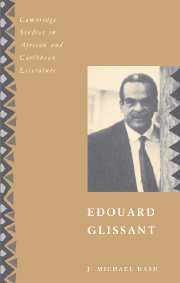Book contents
- Frontmatter
- Contents
- Acknowledgements
- Chronology
- Introduction
- 1 Contexts
- 2 The poetic intention: Un champ d'îles, La terre inquiète, Les Indes, Soleil de la conscience
- 3 Novels of time and space: La Lézarde, Le quatrième siècle
- 4 Writing the ‘real country’: L'intention poétique, Malemort, Boises, Monsieur Toussaint
- 5 Towards a theory of Antillanité: La case du commandeur, Le discours antillais
- 6 A poetics of chaos: Pays rêvé, pays réel, Mahagony, Poétique de la relation
- Notes
- Bibliography
- Index
4 - Writing the ‘real country’: L'intention poétique, Malemort, Boises, Monsieur Toussaint
Published online by Cambridge University Press: 29 September 2009
- Frontmatter
- Contents
- Acknowledgements
- Chronology
- Introduction
- 1 Contexts
- 2 The poetic intention: Un champ d'îles, La terre inquiète, Les Indes, Soleil de la conscience
- 3 Novels of time and space: La Lézarde, Le quatrième siècle
- 4 Writing the ‘real country’: L'intention poétique, Malemort, Boises, Monsieur Toussaint
- 5 Towards a theory of Antillanité: La case du commandeur, Le discours antillais
- 6 A poetics of chaos: Pays rêvé, pays réel, Mahagony, Poétique de la relation
- Notes
- Bibliography
- Index
Summary
Ceux dont la survie chemine en la germination de I'herbe!
Aimé CésaireGlissant returned to Martinique in 1965 to take up a post as professor of philosophy at the Lycée des Jeunes Filles, and spent the next fifteen years in the Caribbean. Perhaps the most dominant concern for Glissant during these years was the shift in emphasis from the individual imagination to group consciousness, from intention, to use Glissant's terms, to relation. At this time, he was acutely aware of the difficulties faced by the writer returning to the Caribbean, due to the differences between his experience in France and the problems posed by the home community. The situation in Martinique had been aggravated by nineteen years of chronic dependence because of departmentalisation. For Glissant, Martinique in 1965 was a cultural desert and his challenge was to devise collective solutions or at least a group response to the dilemma facing the French Caribbean Department.
The total integration of Martinique within a French sphere of influence meant a number of things: the destruction of local, self-supporting productivity, the loss of control over internal affairs, the erosion of a local Creole culture and the relentless europeanisation of all areas of life. Even Césaire himself, under whom these changes were ironically taking place, would soon recognise that departmentalisation carried with it the risk of metropolitan tyranny and was relentlessly leading to what he called ‘progressive underdevelopment’.
- Type
- Chapter
- Information
- Edouard Glissant , pp. 91 - 125Publisher: Cambridge University PressPrint publication year: 1995



